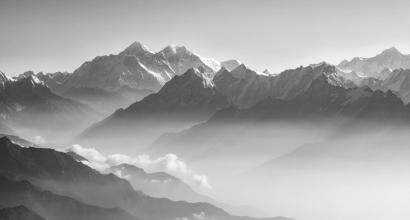Human nature is composed of the triad of guṇas – sattva, rajas, and tamas. It is true of the universe also. A man’s inner nature influences his outward behaviour and vice-versa. The essence of graha-atigraha mentioned in the Bṛhadāraṇyaka-upaniṣad is this mutual impulse.
tattvavit-tu mahābāho guṇa-karma-vibhāgayoḥ ।
guṇā guṇeṣu vartanta iti mattvā na sajjate ॥ (BG 3.28)
One who knows the principle of distribution of natural temperaments (guṇa) and actions (karma) understands that all the workings in the world are a dialogue between the guṇa-triad internal to the jīva and the guṇa-triad of the universe. Also he understands that the ātmā is unaffected by these transactions and remains an uninvolved outsider.
The jñānī knows that life in this world is a working of prakṛti and is not related to the jīva – like the sahṛdayas (connoisseurs) watching a play. Life in this world needs to be only seen from afar and enjoyed. Actors who come on stage perform different actions – they laugh, cry out, and scream. The audience, without really being a part of the happenings, remain separate but see, experience, and enjoy the play.
The mental condition of the jñānī is thus –
sākṣī cetā kevalo nirguṇaś-ca (Śvetāśvatara-upaniṣad 11)
“Witnessing everything, isolated, devoid of all guṇas.”
Prakṛti seems amuse herself through her manifold activities. That is the līlā of Bhagavān and is beyond our control. A jñānī constantly keeps this in mind. Ordinary people do not differentiate ātmā from the body and other upādhis (attributes). They are of the illusion that the body is the jīva and the ātmā. Indeed, the body consists of three aspects – 1. Sthūla {Gross, tangible form}, 2. Sūkṣma {subtle form}, 3. Liṅga or Kāraṇa {The subtle form that is unaffected by transmigration between bodies.} Until body, mind, and notions arising from memories of previous births captivate the jīva, it remains just that – a mere jīva. Our mind mistakes jīva to be the supreme ātmā and vice versa because that is how it understands the nature of the body. But a jñānī is ‘kṛtsnavit’ – ‘one who knows everything.’ He sees that ordinary people are deluded. But he does not thoughtlessly seek to liberate them from their path. Spiritual attainment is proportional to one’s intellectual capacity, skill and virtue. People should not be prevented from pursuing the sādhanā that they deem fit. If we stop them from doing what is suitable for them, they will lose their sādhanā; our instruction will be unsuitable for them and they will not be able to follow it and thus they will deteriorate. When learning to walk, it is not good if one forgets the gait of a crow but cannot learn the gait of a swan. The gītā therefore says,
na buddhibhedaṃ janayet ajñānāṃ karmasaṅginām (BG 3.26)
If people follow what is right for their stage, they will earn the ability to enter higher stages.
This is what our enthusiastic vedāntins should realise. Proclaiming the ultimate truth to lay people might be detrimental to them, rather than being helpful. If a father teaching his young child to walk well pulls him at his speed, the child might lose its motivation, energy or even his life. It is the same in spiritual pursuit. There must not be an undue hurry to make progress in the path of self-realisation.
The initial requirement for the study of Vedānta is to keep the mind under control and to be honest in the work one is doing. We must pay more attention in nurturing this common worldly moral conduct. People are more engaged in disputes—of “Dvaitamu sukhamā advaitamu sukhamā” [A famous kriti by Sri Tyāgarāja]—whether dvaita is better or advaita is better. It is useless. All interpretations of Vedānta expect purity of the jīva and the six-fold qualities of śama, dama, etc. [Śamādi-ṣaṭka-saṃpatti refers to śama, dama, titikṣā, śraddhā, uparati, and samādhāna.] We have to give more importance to that.
~
Bhagavān has summarised the relationship between jñāna and karma. An ordinary man thinks that he is the one performing karma, from the point of view of the jīva. The jñānī knows that he is not the doer but prakṛti is the doer. The distinction between the two of them is not in performing karma; it is common to both. For ordinary people, karma is preparation for jñāna. For realised jīvas, karma is the result of jñāna. Bhagavān thus set the boundaries of the pervasiveness of karma and said, “Arjuna, the result of your karma does not belong to you. Whatever be the result, understand that it belongs to me (that is, to the Paramātmā) and fight without desire or egotism.
mayi sarvāṇi karmāṇi saṃnyasyādhyātmacetasā ।
nirāśīrnirmamo bhūtvā yudhyasva vigatajvaraḥ॥ (BG 3:30)
“Dedicate all your actions to me with your mind intent on the supreme ātmā. Break off from your affliction. Do not fear. Fight without anguish!”
Even a great jñānī follows the path paved by his own prakṛti. Then how is jñāna useful for him? What is the use of self-realisation when Prakṛti dictates everything? It is this: when a jñānī performs karma, his negative mental qualities like desire and hatred are kept in check. Of course, he does perform karma; but it is untainted by love or hate. An ordinary man, on the contrary, is afflicted by desire and hatred. He also works according to the dictum of his nature, but the difference is in the condition of their minds.
prakṛtiṃ yānti bhūtāni nigrahaḥ kiṃ kariṣyati (BG 3.33)
Nature is all-powerful in everything. Is it possible for someone born with a voice like that of a beast of burden to sing like the Gandharvas? Natural qualities are always present in their places, without fail. In any situation, nature rushes forth to show herself. This nature is different for different people. In the context of a jīva, it is of the form of unconscious tendencies inherited from previous births. It is the result of past actions and conditioning. Therefore, nature works differently for different people. It then follows that dharma is also different for different people. Dharma follows Nature. The dharma of a being is based on the nature that it houses. That is svadharma. Karma has to be performed, it cannot be avoided. But what kind of karma should it be? The karma is in the form of one’s svadharma. While performing karma is inevitable, performing it as one’s svadharma is most excellent.
śreyān-sva-dharmo viguṇaḥ para-dharmāt-sv-anuṣṭhitāt ।
sva-dharme nidhanaṃ śreyaḥ para-dharmo bhayāvahaḥ॥ (BG 3:35)
"Arjuna, you are a kṣatriya. Your dharma is to fight. Saṃnyāsa is dharma for brāhmaṇas; indeed only for a few of them, for those in whose minds dispassion has arisen by itself. Indeed, śāstras say that saṃnyāsa is to be avoided in the Kali-yuga. Only those who have been dispassionate and weary for a long time are eligible for saṃnyāsa. It is prescribed only for those who are genuinely disinterested in the pleasures of the world. Renouncing the world is to be done when one is truly disinterested in it. You, however, are a kṣatriya. Why are you trying to follow a specific dharma prescribed only for a few brāhmaṇas? It is better to perform one’s own karma even if all its attributes are not palatable. Do not consider Viśvāmitra as your role model. He obstinately persevered and won, and is worthy of our praises and prostrations. However, your nature is different. You have to fight. Fight!"
To be continued...
The present series is a modern English translation of DVG’s Kendra Sahitya Akademi Award-winning work, Bhagavad-gītā-tātparya or Jīvana-dharma-yoga. The translators wish to express their thanks to Śatāvadhāni R Ganesh for his valuable feedback and to Hari Ravikumar for his astute edits.

















































